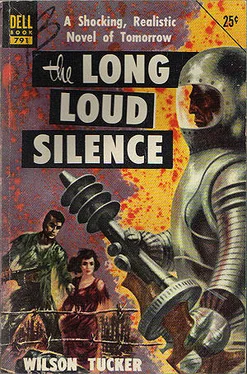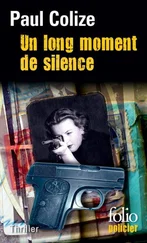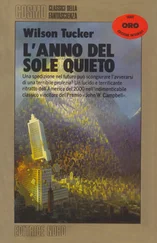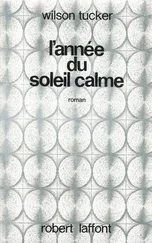Wilson Tucker - The Long Loud Silence
Здесь есть возможность читать онлайн «Wilson Tucker - The Long Loud Silence» весь текст электронной книги совершенно бесплатно (целиком полную версию без сокращений). В некоторых случаях можно слушать аудио, скачать через торрент в формате fb2 и присутствует краткое содержание. Город: New York, Год выпуска: 1952, ISBN: 1952, Издательство: Rinehart, Жанр: sf_postapocalyptic, на английском языке. Описание произведения, (предисловие) а так же отзывы посетителей доступны на портале библиотеки ЛибКат.
- Название:The Long Loud Silence
- Автор:
- Издательство:Rinehart
- Жанр:
- Год:1952
- Город:New York
- ISBN:0-89968-375-4
- Рейтинг книги:3 / 5. Голосов: 1
-
Избранное:Добавить в избранное
- Отзывы:
-
Ваша оценка:
- 60
- 1
- 2
- 3
- 4
- 5
The Long Loud Silence: краткое содержание, описание и аннотация
Предлагаем к чтению аннотацию, описание, краткое содержание или предисловие (зависит от того, что написал сам автор книги «The Long Loud Silence»). Если вы не нашли необходимую информацию о книге — напишите в комментариях, мы постараемся отыскать её.
The Long Loud Silence — читать онлайн бесплатно полную книгу (весь текст) целиком
Ниже представлен текст книги, разбитый по страницам. Система сохранения места последней прочитанной страницы, позволяет с удобством читать онлайн бесплатно книгу «The Long Loud Silence», без необходимости каждый раз заново искать на чём Вы остановились. Поставьте закладку, и сможете в любой момент перейти на страницу, на которой закончили чтение.
Интервал:
Закладка:
Gary slumped in the rear seat of an abandoned automobile and cursed himself for staying in the North. He should have used his head, should have begun moving south when the first chill hung in the air. He was a fool for staying here.
He could have gone back to the fisherman's cabin in Florida — just to visit, of course. He wouldn't have wintered there. But he could have gone back in response to a sincere invitation: come back and see the kid. Whose kid, he wondered briefly? Or he could have pushed deeper into the South, there were plenty of beaches in Florida; he could have holed up in one of those tourist cabins on the St. Petersburg beach, or gone down to the Keys below Miami. Anywhere to avoid this . New Orleans was all right — he could have gone back there. For some reason or other that city wasn't accepting its fate as tragically as the northern river towns. New Orleans attempted to continue as before, its population thinned down, the ferries no longer operating and the Huey Long bridge blocked by a pair of squat tanks. But it went on living after a fashion.
Gary shifted his cramped position on the car seat and told himself again he was a damned fool.
The blast of a shotgun brought him to his knees, his eyes peering through a dirty rear window.
He saw a figure running toward him, toward the old automobile, a small person who labored and stumbled as he ran. The figure flung a hasty glance over his shoulder and tried to increase his speed. Gary peered beyond him and discovered the two stalking men. They both carried guns and one of them was reloading as he ran, intent on capturing or killing the fleeing quarry.
Gary snatched up his newly acquired shotgun and flung open the car door, taking care to keep himself out of sight on the rear seat. The little runner continued blindly on toward the car, unaware of his presence or the movement of the door. Gary readied the shotgun. There was a second burst of fire from the pursuers and the youngster screamed, either in pain or terror.
He batted his eyes and waited, trigger finger tensed. It had been a child's scream, a young girl's.
With hoarse, rasping sounds in her dry throat, the girl reached the automobile and flung herself through the open door to collapse on the floor. Gary reached over and pulled shut the door behind her. The girl whirled and saw him, screamed again and sobbed with a tortured breath. Her eyes were dilated with fright. She looked to be ten or twelve, maybe.
“Cut it out,” he said roughly. “I'm not going to hurt you.”
She didn't answer him, didn't stop crying and rolling her eyes. With his left hand he reached over and cranked down the rear window, then turned to open the other at his feet. The noise of the two running men came plainly to his ears, their feet making slapping noises in the snow. As best as he could judge, both were following the same path the girl had made, both were running together or nearly so. They should arrive at the car within seconds, approaching on the same side to use the door the child had used.
Gary glanced down. “Now keep your head down, kid, and I'll get rid of these guys. You won't get hurt.”
The rear door was yanked open and the girl screamed once more, frantically pushing herself into the far corner.
“I got her! I got the little—”
Gary quietly raised the shotgun to the man's face and fired at his open mouth. The blast cut the head from the shoulders like a hot, ragged knife. Without pause or lost motion, Gary rose swiftly to his knees and poked the smoking barrel through the open door to fire again. It caught the running man in mid-stride, bending him double. As he tumbled to the snow, Gary pumped a second shot into the body. Calmly then, he scanned the horizon for further movement, saw none, and sank back on the seat. With his foot he kicked the severed head outside and shut the door, finally running up the windows.
The child was still in the corner, her face covered by her hands. He wondered how much she had seen. Her crying was hysterical, uncontrolled, and he didn't know how to stop it. She was too little to slap, to gag.
It was more than an hour before he could calm her, could persuade her that he intended no harm, to stop her crying and listen to him, to talk to him. Her story was disconnected and not always intelligent, continually punctuated by fits of dry sobbing. He watched the road and near-by fields, listening to her.
Her name was Sandy, she said. Sandra Hoffman. She was twelve years old and she lived with her two brothers and her parents on the farm “over there.” Gary could not recall any farmhouse near-by and guessed that she had wandered for several miles. Shortly after daylight this morning, she and her older brother Lee—”he's fifteen, almost" — had gone out rabbit hunting. The early morning hours of the first snowfall is always good rabbit weather, she assured him. Her father had warned them to stay close to the farm but no one suspected any real danger — there had been many “stealers” about the place, trying to get away with food and clothing, but none offered bodily harm unless caught in the act. She and Lee must have walked farther from home than they realized. They hadn't found any rabbits.
Lee had been ahead of her, concentrating on a thicket likely to be concealing rabbits when the two men jumped them. The men had been hiding in the thicket and as they approached, leaped out at them with guns. Lee was carrying his .22 rifle. He fired at them without hesitation, probably in fright rather than fight, and missed. One of the men fired back at him, and Lee fell.
She turned and ran, hiding among the trees for a long time—”hours and hours" — before she heard them hunting her again. She kept moving around, trying to be quiet, but they finally flushed her. She took to her heels, finding the snow-covered road and running along it until she saw the automobile. They kept shooting at her, too, but they didn't hit her. And now what were they going to do?
Going to do? “I don't know,” Gary replied absently. “Let me think about it.”
With her question, a vague idea was born in his mind that he might be able to turn the incident to his advantage. Abandoning the child, simply walking away on her was out of the question; he might have done it if she were older and a boy — if she were her brother Lee, for instance. But he couldn't leave her there in the deserted car. He realized that it could be many tedious weeks, perhaps even bitter months before he could work his way back to the Gulf coast — and there always remained the danger of starving or freezing before reaching it. On the other hand if he stayed in the North, stayed here , there was the very real possibility that he could talk his way into a warm and comfortable house for the winter — with food on the table three times a day. He just might be able to use Sandy, and the body of her brother, as his entrance into that farmhouse.
It was well worth trying. He sat up.
“The first thing to do,” he said to the girl, “is to go back and get Lee. Then we'll find your house.”
“But I don't know where he is!” she wailed.
He put out a hand to ruffle the stockingcap pulled down over her hair. “Aw, that'll be easy for me. All we have to do is follow your backtrail. Say — I'll bet you didn't know I was a scout in the army!”
She gazed at him, round-eyed. “Was you really?”
“Yep. Used to track Germans all over the place.”
“Japs too?”
He smiled at her and nodded. “Japs, too. I tracked them all. Let's be moving along now — your dad will be worrying about you.” He opened the door on the opposite side of the car away from the two bodies and helped her out, to lead the way along the erratic, running trail she had left.
Читать дальшеИнтервал:
Закладка:
Похожие книги на «The Long Loud Silence»
Представляем Вашему вниманию похожие книги на «The Long Loud Silence» списком для выбора. Мы отобрали схожую по названию и смыслу литературу в надежде предоставить читателям больше вариантов отыскать новые, интересные, ещё непрочитанные произведения.
Обсуждение, отзывы о книге «The Long Loud Silence» и просто собственные мнения читателей. Оставьте ваши комментарии, напишите, что Вы думаете о произведении, его смысле или главных героях. Укажите что конкретно понравилось, а что нет, и почему Вы так считаете.












